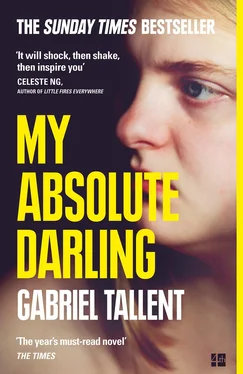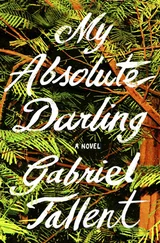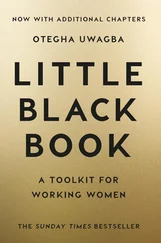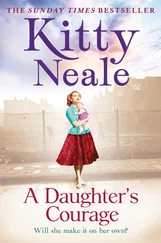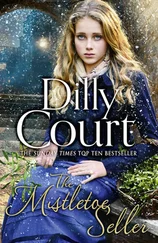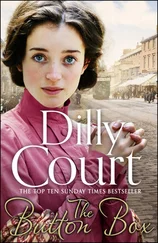“Look at that, kibble,” Martin says.
“You don’t have to wait,” she says.
“Looking at something like that, good for your soul. You look and you think, goddamn. To study it is to approach truth. You’re living at the edge of the world and you think that teaches you something about life, to look out at it. And years go by, with you thinking that. You know what I mean?”
“Yes, Daddy.”
“Years go by, with you thinking that it’s a kind of important existential work you’re doing, to hold back the darkness in the act of beholding. Then one day, you realize that you don’t know what the hell you’re looking at. It’s irreducibly strange and it is unlike anything except itself and all that brooding was nothing but vanity, every thought you ever had missed the inexplicableness of the thing, its vastness and its uncaring. You’ve been looking at the ocean for years and you thought it meant something, but it meant nothing .”
“You don’t have to come down here, Daddy.”
“God, I love that dyke,” Martin says. “She likes me, too. You can see it in her eyes. Watch. Real affection.”
The bus gasps as it rounds the foot of Buckhorn Hill. Martin smiles roguishly and raises his beer in salute to the bus driver, enormous in her Carhartt overalls and logger boots. She stares back at him unamused. Turtle climbs onto the bus and turns down the aisle. The bus driver looks at Martin and he stands beaming in the driveway, a beer held over his heart, shaking his head, and he says, “You’re a hell of a woman, Margery. Hell of a woman.” Margery closes the rubber-skirted doors and the bus lurches to a start. Looking through the window, Turtle can see Martin raise his hand in farewell. She drops into an open seat. Elise turns around and puts her chin on the seat back and says, “Your dad is, like—so cool .” Turtle looks out the window.
In second period, Anna paces back and forth in front of the class with her black hair gathered into a wet ponytail. A wetsuit hangs behind her desk, dripping into a plastic bin. They are correcting spelling tests and Turtle hunches over her paper, clicking her pen open and closed with her index finger, practicing a trigger pull with no rightward or leftward pressure at all. The girls have thin, weak voices, and when she can, Turtle turns around in her chair to lip-read them.
“Julia,” Anna says to Turtle, “can you please spell and define ‘synecdoche’ for the class? Then please read us your sentence?”
Even though they are correcting the tests, and even though she has another girl’s test right in front of her, a girl Turtle admires in a sideways-looking and finger-chewing way, even though the word synecdoche is spelled out in the other girl’s neat script and glittery gel-ink pen, Turtle can’t do it. She begins, “S-I-N …” and then pauses, unable to find her way through this maze. She repeats, “S-I-N …”
Anna says gently, “Well, Julia—that’s a hard one, it’s synecdoche , S-Y-N-E-C-D-O-C-H-E, synecdoche . Would anyone like to tell us what it means? ”
Rilke, this other, far prettier girl, raises her hand, forming an excited O with her pink lips. “Synecdoche: a figure of speech in which the part is made to represent the whole; ‘the crown is displeased.’” She and Turtle have traded tests, so Rilke recites this from memory, without looking at Turtle’s page, because Turtle’s page is blank except for the first line: 1. Suspect. Believe. I suspect we will arrive late to the party. Turtle does not know what it means, when the part is made to represent the whole. That doesn’t make any sense to her, nor does she know what it means, the crown is displeased.
“Very good,” Anna says. “Another one of our Greek roots, the same as—”
“Oh!” And Rilke’s hand shoots up. “‘Sympathetic.’”
Turtle sits on the blue plastic chair, chewing on her knuckles, stinking of the silt from Slaughterhouse Creek, wearing a ragged T-shirt and Levi’s rolled up to show her calves, pale and swatched with dry skin. Under one fingernail, a rusty grime of synthetic motor oil. Her fingers have its prehistoric smell. She likes to massage the lubricant into the steel with her bare hands. Rilke is applying her lip gloss, having already gone down Turtle’s test with a neat little x beside each empty line, and Turtle thinks, look at this slut. Just look at this slut. Outside, the windswept field is spotted with puddles, the flooded ditch cut from the ash-colored clay, and beyond that, the forest’s edge. Turtle could walk into those woods and never be found. She has promised Martin that she will never, not again.
“Julia,” Anna says. “Julia?”
Turtle turns slowly around to look at her and waits, listening.
Anna, very gently, says, “Julia, if you could pay attention, please.”
Turtle nods.
“Thank you,” Anna says.
When the bell rings for lunch, all of the students stand up at once and Anna walks down the aisle and puts two fingers on Turtle’s desk and, smiling, holds up one finger to indicate that she needs a moment. Turtle watches the other students leave.
“So,” Anna says. She sits down on a desk and Turtle, quiet and watchful, attentive to faces, can read almost everything in her; Anna is looking Turtle up and down and thinking, I like this girl, and weighing how to make this work. It is unreasoningly strange to Turtle, who hates Anna, has never given Anna any reason to like her, does not like herself. Turtle thinks, you whore.
“So,” Anna says again, “how did you feel about that one?” Her face becomes gently questioning—biting her lip, allowing her eyebrows to climb up, wet strands of hair escaping her pony tail. She says, “Julia?” To Turtle’s north-coast ears, Anna has an accent, cool and affected. Turtle has never been south of the Navarro River, and never north of the Mattole.
“Yeah?” Turtle says. She has allowed the silence to go on too long.
“How did you feel about that one?”
“Not that good,” Turtle says.
Anna says, “Well, did you get any of the definitions?”
Turtle does not know what Anna wants from her. No, she hadn’t, and Anna must know that she hadn’t. There is only one answer to any of Anna’s questions, which is that Turtle is useless.
“No,” Turtle says, “I didn’t get any of the definitions. Or, I got the first. ‘I suspect we will arrive late to the party.’”
“Why do you think that is?” Anna says.
Turtle shakes her head—it’s beyond saying and she won’t be bullied into saying something else.
“What if,” Anna says, “you stayed in, some lunchtime, and we made flash cards together?”
“I do study,” Turtle says. “I don’t know if that would help.”
“Is there something you think would help?” Anna does this, asking questions, pretending to make a safe space, but there is no safe space.
“I’m not sure,” Turtle says. “I go over all the words with my daddy—” And here, Turtle sees Anna hesitate and she knows that she has made a mistake, because other Mendocino girls don’t use the word daddy . Mostly, they call their parents by their first name, or else Dad. Turtle goes on. “We go over them, and I think what I need is just to go over them myself a little more.”
“So just, put a little more time into it, is what you’re saying?”
“Yes,” Turtle says.
“So how do you study with your dad?” Anna says.
Turtle hesitates. She cannot sidestep the question, but she thinks, careful, careful.
“Well, we go over the words together,” Turtle says.
“For how long?” Anna says.
Turtle works at one finger with her hand, cracks the knuckle, looks up, frowning, and says, “I don’t know—an hour?”
Читать дальше
